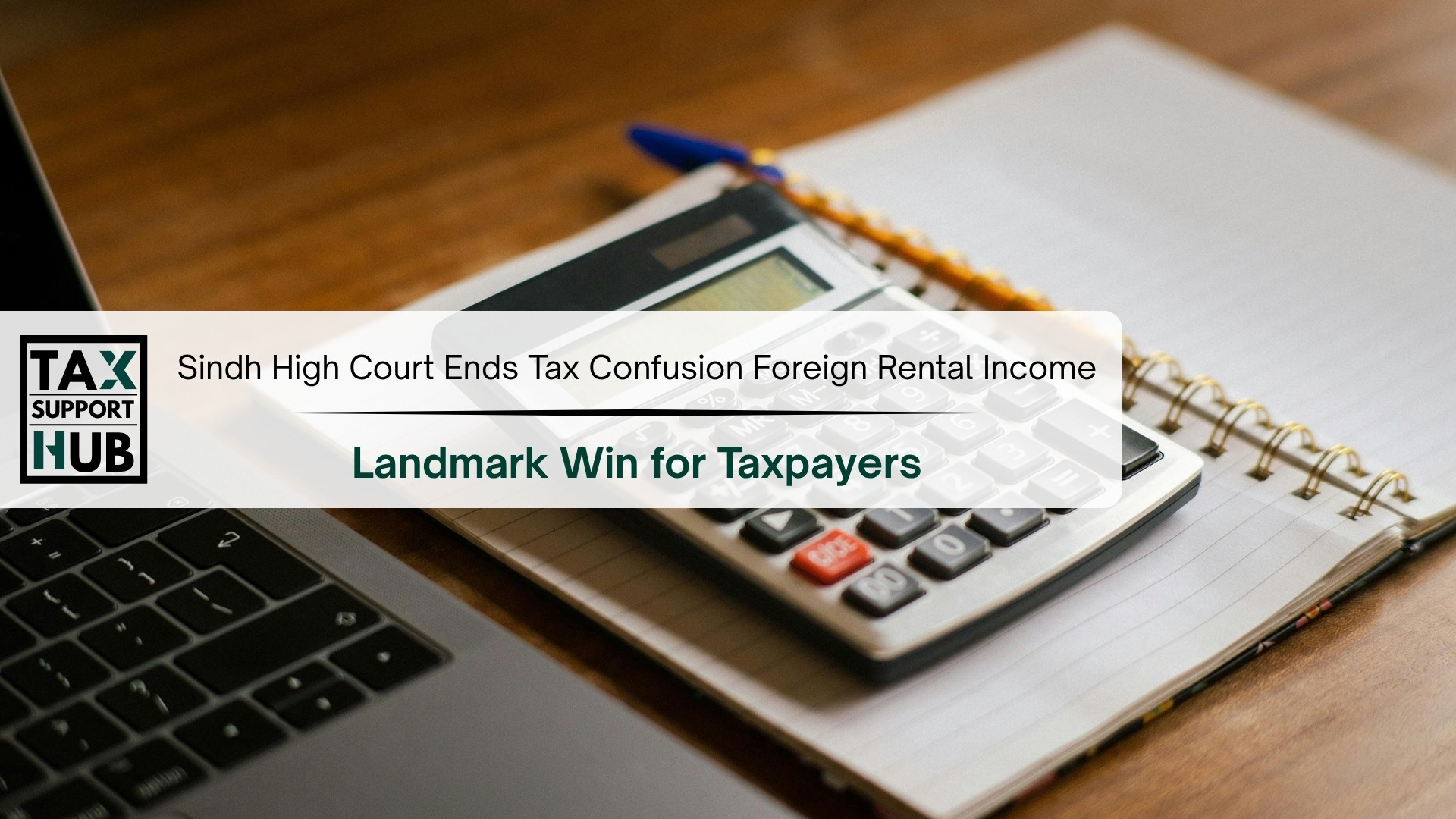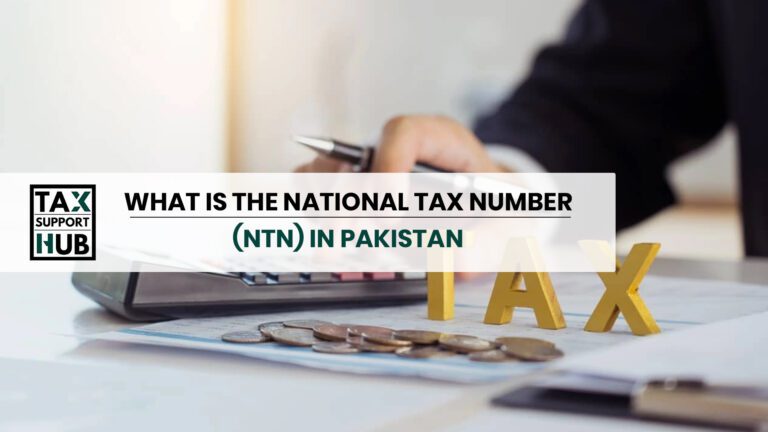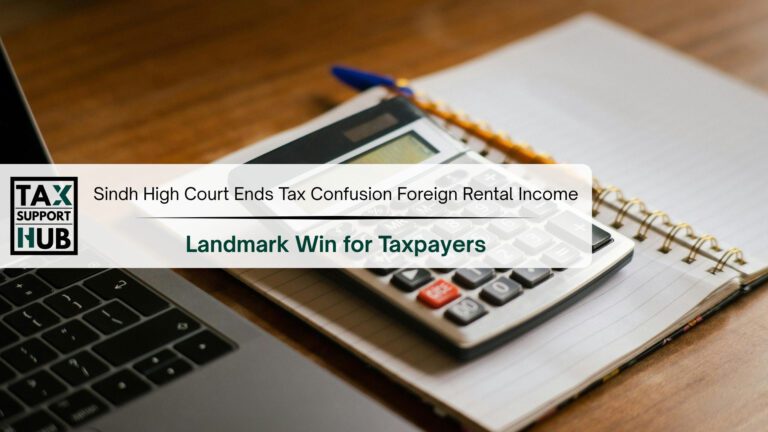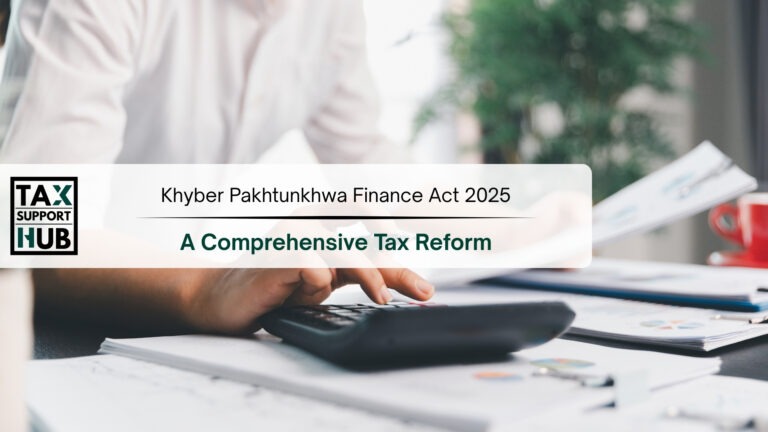On September 24, 2025, the Sindh High Court at Karachi delivered a significant decision in Income Tax Reference Application No. 239 of 2024. This ruling addressed whether a Pakistani resident’s foreign-sourced income (specifically salary and rental income from the UAE) is taxable in Pakistan, in light of Pakistan’s domestic law and its Double Taxation Treaty (DTT) with the United Arab Emirates.
The core legal issue was the interpretation of Section 107 of the Income Tax Ordinance, 2001 and Articles 6 and 17 of the Pakistan-UAE DTT, essentially, whether the treaty’s allocation of taxing rights means Pakistan must exempt such foreign income from tax.
The High Court ultimately answered this question in favor of the taxpayer, aligning with a recent Supreme Court precedent and reinforcing the primacy of DTT provisions over conflicting domestic tax law. Below, we break down the background of the case, the divergent views in earlier rulings, and the broader implications of the High Court’s decision for treaty interpretation in Pakistan.
Background: The Taxpayer’s Case and Treaty Issue
The applicant in this case is a Pakistani resident who, for the tax year 2020, had declared approximately Rs 26.3 million as exempt foreign income, comprising salary earned abroad and rental income from property located in the UAE. The Pakistani tax authorities, however, challenged this treatment. This case also underscores the growing importance of tax advisory for non-residents, particularly where cross-border income and treaty relief are involved. An Assistant Commissioner of Inland Revenue issued notices questioning the exemption and later amended the taxpayer’s assessment to treat that foreign income as taxable (initially classifying it under “income from other sources”). The taxpayer’s stance was that under the Pakistan-UAE Double Taxation Agreement, this UAE-sourced income should not be subject to Pakistani tax, given the treaty’s provisions.
Section 107 of the Income Tax Ordinance, 2001 embeds Pakistan’s commitment to honor its tax treaties by explicitly giving precedence to treaty provisions over domestic law in case of any inconsistency. In other words, if the domestic Income Tax Ordinance would tax certain income but a valid tax treaty allocates taxing rights differently or provides relief, the treaty’s terms prevail. The Pakistan-UAE DTT, like most such treaties, contains articles that allocate taxing rights for various categories of income.
Article 6 of the treaty deals with income from immovable property (such as rental income), while Article 17 addresses certain employment/director-related income. The taxpayer argued that under the treaty, UAE has the primary (or exclusive) right to tax income from property located in the UAE and the relevant employment remuneration – meaning Pakistan must refrain from taxing that income or provide an exemption.
Conflicting Tribunal Views: Lahore vs. Islamabad
When the dispute first went through tax appellate forums, it encountered contradictory interpretations from different benches of the Appellate Tribunal Inland Revenue (ATIR):
- Lahore Tribunal (Sept 2022): In ITA No. 4299/LB/2022 (Tax Year 2021), the Lahore Bench decided a similar case in the taxpayer’s favor. It held that, in light of the Pakistan-UAE DTT, “the right of taxing [the income] has been given only to the state where the property is situated.” In other words, Pakistan cannot charge income tax on properties (and by extension certain incomes) located in a treaty partner state. The Lahore Tribunal interpreted the treaty’s language, particularly the phrase “may be taxed in [the other State]”, as signifying an exclusive taxing right of the source country for immovable property income.
They contrasted this wording with other treaty clauses (e.g. on interest) that say income “may also be taxed” in the source state, noting the deliberate omission of “also” for property and similar income. This, in their view, indicated that Pakistan had agreed not to tax such foreign-sourced income. The Lahore Bench even cited an FBR Helpline clarification that “rental income from UAE is not taxable in Pakistan”.
- Islamabad Tribunal (Nov 2022) By contrast, an Islamabad Bench of the Tribunal (decision dated 07 November 2022) took the opposite view. It ruled in favor of the tax department, effectively allowing Pakistan to tax foreign income despite the treaty. The taxpayer in the Sindh case pointed out that the Islamabad decision ignored the Lahore Bench’s precedent (which was on the same legal point), a breach of the well-entrenched principle of stare decisis (consistency with earlier decisions). The Islamabad ruling did not follow the reasoning that the DTT provided exclusive taxing rights to the source country; instead, it treated the domestic law as applicable, creating a direct conflict in interpretation.
These clashing tribunal outcomes created uncertainty. The taxpayer’s appeal (reference application) to the Sindh High Court highlighted this conflict: one Tribunal bench held the foreign income not taxable by Pakistan under the treaty, while another bench held the contrary. Additionally, the taxpayer argued that where ambiguity exists in tax law or treaties, it should be resolved in favor of the taxpayer. Thus, the stage was set for the High Court to settle the issue.
The High Court Reference and Legal Question
Before the Sindh High Court, the matter crystallized into a single key question (formulated on an earlier date, 16 August 2024, when the reference was admitted):
“Whether on the facts and circumstances of the case, the Respondents No.1 and 2 fell in error while interpreting Section 107, Income Tax Ordinance, 2001, and as a consequence incorrectly interpreted and construed Articles 6 & 17 of the Convention between the United Arab Emirates and the Islamic Republic of Pakistan for the avoidance of double taxation … given the exemptive treatment contemplated therein and the statutory sanction for availing of benefits under such treaties?”
In simpler terms, did the tax authorities err in ignoring the double tax treaty’s provisions (as enabled by Section 107) regarding the taxpayer’s foreign salary and rental income? The taxpayer contended that the authorities had erred – by taxing income that, under the treaty’s “exemptive” scheme, should not be taxed in Pakistan. The reference also raised subsidiary questions, such as the treaty’s precedence over domestic law and the failure of authorities to follow the Lahore Tribunal’s binding decision in a similar case.
Sindh High Court’s Decision: Treaty Overrides, Taxpayer Prevails
At the High Court hearing, a pivotal development was brought to the judges’ attention: in the interim, the Supreme Court of Pakistan had delivered a binding judgment on the very issue of treaty interpretation. Specifically, on 28 November 2024, the Supreme Court decided Civil Review Petitions No. 988 to 1001 of 2023 (commonly referred to as the Interquest Informatics case) in a manner that resolved this legal question in favor of taxpayers.
In that case, the Supreme Court revisited an earlier split decision and ultimately upheld the primacy of Pakistan’s DTT commitments, overturning the FBR’s stance. The apex court accepted that the majority’s prior judgment had been in error and restored the favorable decisions of the High Courts in those appeals.
It categorically dismissed the tax department’s appeals and reinforced that the treaty provisions must be given effect as written. As the Supreme Court succinctly put it, “we accept the present review petitions, recall the [earlier] majority judgment under review and dismiss the appeals of the [tax department], upholding the judgments of the High Court.”
Given this clear Supreme Court pronouncement (which by Pakistan’s judicial hierarchy is binding on all lower courts), both sides before the Sindh High Court conceded that the issue stood decided. It was jointly submitted by the taxpayer’s counsel and the department’s counsel that, in light of the apex court’s ruling, the legal question should be answered in the taxpayer’s favor.
The High Court, bound by the Supreme Court’s decision, agreed. The order of the Sindh High Court therefore records that the question is answered “in favour of the applicant [taxpayer] and against the respondent department.” In practical terms, this means the taxpayer’s foreign salary and rental income (covered by Articles 6 and 17 of the Pakistan-UAE treaty) are not subject to Pakistani income tax, due to the treaty provisions as read with Section 107. The High Court allowed the reference accordingly, and directed that a copy of the decision be sent to the Appellate Tribunal for implementation.
Broader Implications for DTT Interpretation in Pakistan
This decision carries significant implications for how double taxation treaties are applied under Pakistani law:
- Reaffirmation of Treaty Override: It underscores that whenever a tax treaty conflict arises with domestic law, the treaty will prevail. Section 107 of the Income Tax Ordinance enshrines this principle, ensuring Pakistan honors its international tax commitments. The courts have now robustly enforced Section 107, giving taxpayers confidence that treaty reliefs or exemptions are not merely theoretical but legally enforceable.
- Exclusive Taxing Rights and “May be Taxed”: The case clarified the interpretation of treaty language like “income may be taxed in the other Contracting State.” The Tribunal and ultimately the higher courts accepted that for certain income (immovable property income, and by extension the specific income covered under Article 17 in this treaty), this phrasing was intended to confer an exclusive taxing right on the source country.
Pakistan, as the residence country in this scenario, had agreed not to tax that income. This interpretation is especially important for treaties with countries (like the UAE) that do not impose income tax, it effectively means such foreign income can escape Pakistani tax, but that is a result of the treaty bargain. The Supreme Court’s resolution in Interquest supports a purposive, context-aware reading of treaty terms rather than a rigid domestic-law view.
- Consistency in Tax Adjudication: The saga also highlighted the need for consistency in judicial/tribunal rulings on tax matters. The Lahore Tribunal’s 2022 decision was effectively vindicated, and the Islamabad Tribunal’s contrary view was disapproved as per incuriam (given it ignored existing precedent). The Federal Board of Revenue’s own instructions recognize that Tribunal orders are binding on tax officials; a point the Lahore Bench had stressed. Going forward, one can expect more uniform application of treaty provisions across different jurisdictions in Pakistan.
- Favoring the Taxpayer in Ambiguity: The High Court reference also invoked the principle that ambiguities in tax law should be resolved in the taxpayer’s favor. By aligning with the treaty and the Supreme Court’s interpretation, the decision reinforces this taxpayer-friendly approach in cases of unclear law or clashing provisions.
- Strengthening International Commitments: On a broader canvas, the outcome bolsters Pakistan’s reputation for honoring its international agreements. The Supreme Court, in its judgment, took the opportunity to emphasize that Double Taxation Treaties are crucial for fostering cross-border economic cooperation and must be interpreted in light of their “object and purpose”, not just domestic technicalities.
Such treaties allocate taxing rights between countries to avoid double taxation and prevent fiscal evasion, and Pakistani courts will strive to uphold that balance. This assurance is vital for foreigners investing in Pakistan and for Pakistani residents with overseas engagements, as it provides predictability and fairness in cross-border taxation.
Conclusion
The Sindh High Court’s ruling in ITRA No. 239/2024 is a landmark affirmation that treaty law trumps domestic tax law where the two conflict, particularly regarding foreign-sourced income. For taxpayers, the judgment brings relief and clarity: income like foreign property rent or salary, if covered by an avoidance of double taxation agreement, cannot be doubly taxed by Pakistan, provided the treaty allocates those items to the other state.
For the tax administration, it serves as a directive to align with Pakistan’s treaty obligations and the interpretations set by superior courts. This development will likely influence tax assessments and audits involving any of Pakistan’s numerous DTTs, ensuring that Pakistan continues to act in good faith on the international stage while safeguarding taxpayers from unlawful double taxation.
FAQs — Sindh High Court’s Decision on Foreign Rental Income
Q1. What was the key issue before the Sindh High Court?
The main question was whether a Pakistani resident’s foreign-sourced income—specifically salary and rental income from property situated in the United Arab Emirates (UAE)—was taxable in Pakistan under the Income Tax Ordinance, 2001, or whether it was exempt under the Pakistan-UAE Double Taxation Treaty (DTT).
Q2. Which legal provisions were examined in the case?
The Court examined Section 107 of the Income Tax Ordinance, 2001, which gives treaty provisions precedence over domestic law, and Articles 6 and 17 of the Pakistan-UAE DTT, which allocate taxing rights between the two countries for income from immovable property and employment.
Q3. What did the taxpayer argue?
The taxpayer contended that under the Pakistan-UAE DTT:
- Rental income from immovable property situated in the UAE and salary income earned there are taxable only in the UAE, not in Pakistan.
- Therefore, Pakistan must exempt such income from tax.
- The taxpayer relied on the treaty override principle enshrined in Section 107 of the Ordinance.
Q4. Why was there confusion before this judgment?
There were conflicting Tribunal decisions on the same issue:
- The Lahore Tribunal (2022) held that such income is not taxable in Pakistan since taxing rights belong to the UAE under the DTT.
- The Islamabad Tribunal (2022) took the opposite view, holding that Pakistan could still tax the income under domestic law.
This inconsistency created uncertainty for taxpayers.
Q5. How did the Sindh High Court resolve the issue?
The Court followed the binding precedent of the Supreme Court (decision dated 28 November 2024 in the Interquest Informatics case) and ruled that:
- Treaty provisions prevail over domestic tax law.
- The Pakistan-UAE DTT grants exclusive taxing rights to the source country (UAE) for rental and related income.
- Consequently, such foreign income is not taxable in Pakistan.
Q6. What did the Supreme Court hold in the Interquest Informatics case?
The Supreme Court clarified that Pakistan must honor its international tax treaties and interpret them in line with their object and purpose, not narrowly through domestic law. It restored favorable High Court judgments and rejected the FBR’s appeal, confirming that DTTs override conflicting domestic provisions.
Q7. What does “may be taxed” mean in a tax treaty?
In this context, the phrase “may be taxed in the other Contracting State” grants exclusive taxing rights to the country where the income arises (UAE). This differs from “may also be taxed,” which allows both countries to tax. The omission of “also” in Articles 6 and 17 indicates that Pakistan relinquished its right to tax such income.
Q8. What are the broader implications of this ruling?
- Reaffirms Treaty Override: Section 107 ensures DTTs take precedence over domestic laws.
- Promotes Consistency: Conflicting Tribunal interpretations are now resolved in line with the Supreme Court’s and High Court’s reasoning.
- Taxpayer Relief: Ambiguities must be interpreted in favor of the taxpayer.
- International Credibility: Strengthens Pakistan’s reputation for honoring its treaty commitments, promoting investor confidence.
Q9. Who benefits from this decision?
- Overseas Pakistanis earning income from UAE property or employment.
- Resident taxpayers with foreign income covered under valid DTTs.
- It provides clarity for individuals and corporations relying on treaty protection from double taxation.
Q10. Does this mean all foreign income is exempt from Pakistani tax?
No. Only income covered by an applicable Double Taxation Treaty (DTT) and allocated exclusively to the other state is exempt. Each treaty must be reviewed individually to determine whether the income is exclusively taxable abroad or subject to relief or credit in Pakistan.
Q11. What should taxpayers do following this judgment?
Taxpayers with foreign rental or salary income should:
- Review applicable DTTs for their income source country.
- Declare income correctly in returns, citing treaty exemption.
- Maintain documentary evidence of income source and treaty applicability.
- Seek professional advice if unsure about treaty interpretation.




